#neurodiversity in fiction
Text
Should All Writers Have Neurodivergent Characters? Part 1
I’d argue that since life is full of neurodivergent people, fiction ought to be as well.
We seem to be in a transitional time in the literary world: in the last 10-15 years, an increasing number of neurodivergent and disabled authors have written characters with the same conditions or differences that they have. Alongside this boom in fiction, we have countless YouTubers, podcasters, bloggers,…

View On WordPress
#ableism in media#disability representation#how to write#Media Representation#neurodivergent characters#neurodiversity#neurodiversity in fiction#neurodiversity in media#writing life
2 notes
·
View notes
Text
Free Book Chat and SEEDs for Autism Fundraiser
I’ll be discussing the relevance of neurodiverse characters in historical fiction at SEEDs for Autism in Phoenix on Saturday, August 12, 2023, at 11:00 a.m.
The Historical Novel Society – Arizona Chapter (HNS-AZ) is partnering with SEEDs to host the free public event for anyone who appreciates historical fiction. Both readers and writers will find something of interest in the presentation,…
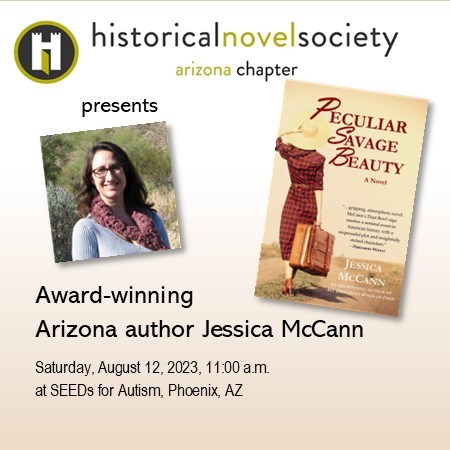
View On WordPress
#austismawareness#book recommendations#Events#historical fiction#Jessica McCann#neurodiversity in fiction#novelist#Peculiar Savage Beauty#writing tips
0 notes
Text
Okay, well, I was planning to build up some hype, but
🦇🎃HAPPY HALLOWEEN🎃🦇
Lorehaven Bound: A Hunger Pangs Short is now available on Amazon.
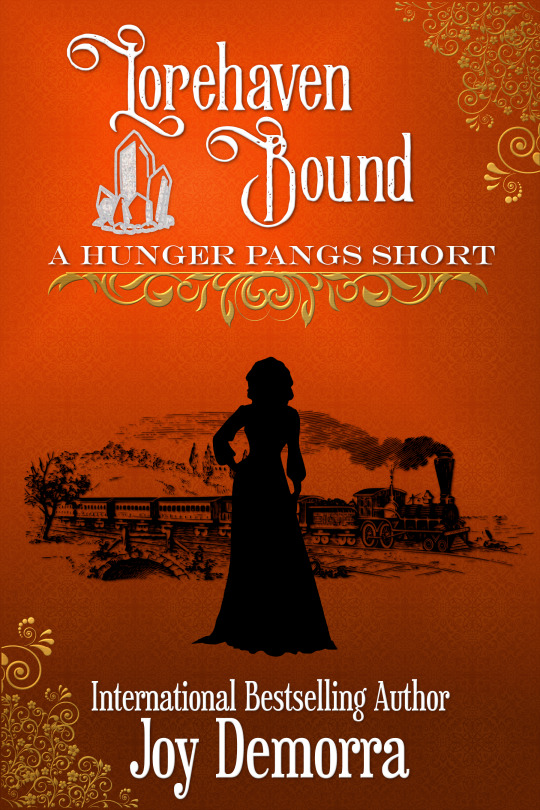
A train ride through the Nevrondian countryside should be a calming proposition, but for Ursula, it isn't. Her thoughts swirl, fixated on one thing... make that two things. Specifically Nathan Northland and Vlad Blutstein. It's not just because they are both breath-stealingly attractive—although to be fair, that doesn't hurt. It's because they surprised her, and Ursula is very rarely surprised.
Even more confounding is her reaction to them, particularly the vampire, Vlad. Just what is she supposed to do about these... feelings?
All Ursula knows is that she doesn't have time for emotions right now. Not when the fate of the world is at stake. She can deal with this later. First, she's got to figure out what story she's going to tell the sure-to-be-furious Alfbern. Then, she needs to catch up on all the sleep she missed before hitting the road again. Surely, she can do those things while being Lorehaven Bound.
*
This story is a 10,000-word character study/missing moment that takes place immediately after Hunger Pangs: True Love Bites. You will want to read that first if you don't want to be spoiled for the events in that book!
---
💖 Available now on Amazon
💖 Apple, Kobo, Smashwords, and more... (links still populating.)
💖Payhip - my personal storefront 💖
Happy reading!
Okay, thanks, love you all, bye.
ID: A red book cover showing a feminine figure standing in front of a steam strain. The title reads Lorehaven Bound, A Hunger Pangs short by International Bestselling Author Joy Demorra. There is a glittery crystal next to the text, and gold decorative swirls adorn the corners.
#Hunger Pangs series#Hunger Pangs: True Love Bites#Phangs#Joy Demorra#booklr#LGBT romance#LGBT fiction#queer fiction#queer romance#fantasy gaslamp romance#bisexual romance#LGBT fantasy#queer fantasy#paranormal romance#shifter romance#neurodiverse rep#indie author#own voices#authors of Tumblr#buy links#affiliate links#no romance in this one#just a lot of unexpected pining and blushing#and realizing you might have a crush on a vampire
1K notes
·
View notes
Text
Non-verbal & non-speaking characters in Audio Dramas

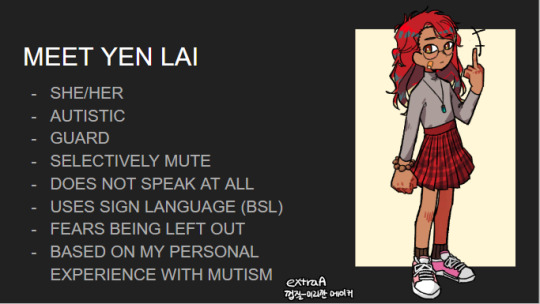
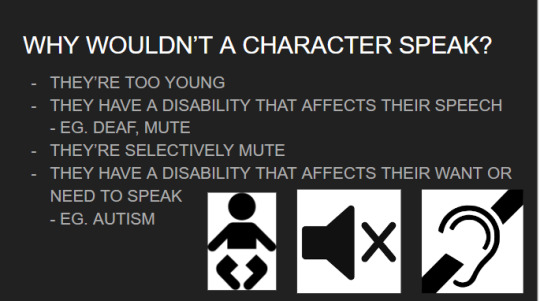

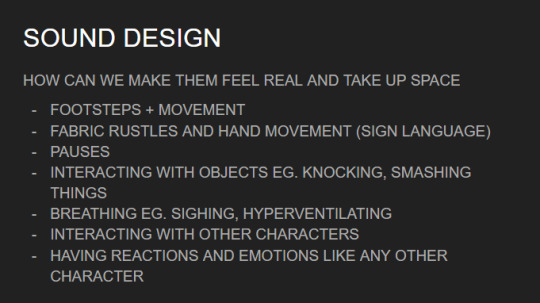
A PowerPoint was created after receiving questions as to how we could have characters that don't speak in our show.
For an audio version, check our TikTok.
Suggestions for other ways to give non-speaking characters space in shows are welcome!
This presentation was made by someone who is mostly non-verbal and previously fully non-speaking.
#non verbal#disabled#disability awareness#actually autistic#autism awareness#podcast#audio drama#queer horror#indie podcast#lgbtq#lgbt fiction#horror#indie#surreal horror#audio fiction#autism#audio#neurodiverse artist#neurodivergent#neurodiverse stuff#neurospicy#non speaking#nonverbal#adhd#executive dysfunction#autistic burnout#powerpoint#presentation#disabled characters#neurodivergent characters
481 notes
·
View notes
Text
⭐TO SHAPE A DRAGON'S BREATH⭐
🍾 Congratulations Moniquill Blackgoose 🥂
Qualified for all 2024 awards for Fantasy, YA, and Debut Novel!
Now on the 4th printing and being featured on Best Book of the Year lists, such as:
Washington Post's 10 Best Science Fiction & Fantasy Novels of 2023
https://www.washingtonpost.com/books/2023/11/14/best-science-fiction-fantasy/
Chicago Public Library Must-Read Books of 2023: Fantasy, Horror & Sci-Fi https://chipublib.bibliocommons.com/list/share/199702383/2422351289
NPR's Book We Love
https://apps.npr.org/best-books/#year=2023&book=336
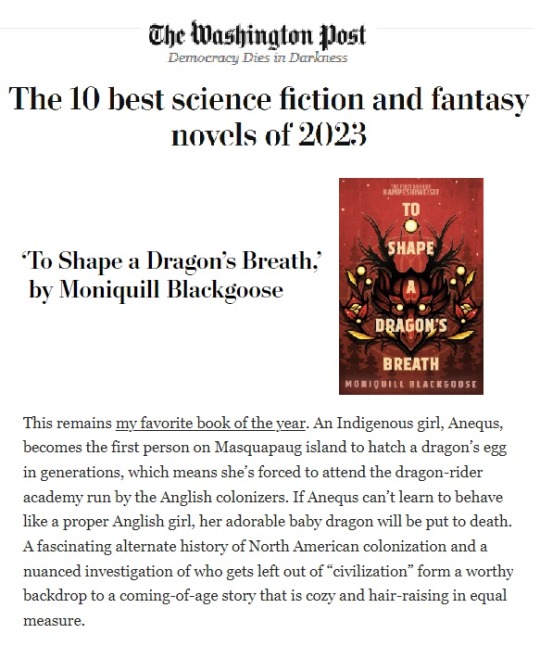
Pop Sugar's Best New Fantasy Books
https://www.popsugar.com/entertainment/best-new-fantasy-books-2023-49056293
#to shape a dragon's breath#fantasy#ya fantasy#ya fiction#gaslamp fantasy#own voices#best fantasy books#bookblr#bookish#am reading#queer sff#queer representation#neurodiversity
75 notes
·
View notes
Text
Accessibility for Neurodivergence and Mental Health
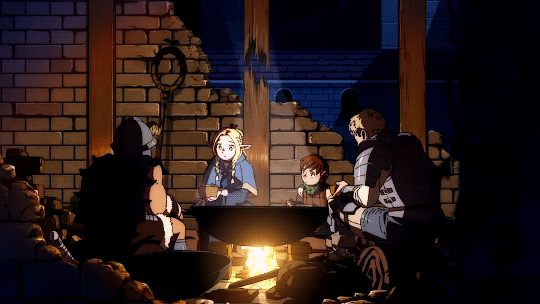
Okay, let's talk a bit more about accessibility in worldbuilding - especially in terms of making a world more accessible to neurodivergent people and folks who struggle with their mental health.
Now, let me start with one thing: While we obviously do not know a lot of how neurodivergent people lived in historical times - especially given that the concept was not around back then - but it is generally believed that especially for people with ADHD and a variety of forms of Autism live was actually a lot better, because a lot of out issues are closely linked with the fact that our brains do not do "9 to 5 work in an office". This is not true for all of us, but for quite a few. There is also some autistic people were seen a valuable for some of their unique traits.
It should at this point also be noted that in general it is also believed that in medieval societies people did work less than they do these days. (Around 30 hours a week.) Which also will be a lot more bearable for a lot of people with both neurodivergent brains and generally mental health struggles. Especially as outdoor work will also be considered easier for a lot of folks. Hence there is a chance that in a medieval setting for example folks might need a bit less in terms of accessibility, as their needs are generally already met.
That said, accessibility for a lot of neurodivergent people means first and foremost to create spaces for retreat. Meaning: Some sort of space or room, where folks can unwire. Soft, and dimmed light, maybe some good place to sit down, silence or alternative very soft noises. To allow for those places in public spaces and work places is just important for neurodivergent folks.
Of course, this is a bit less pressing in a setting where people are already in nature all the time. But especially science fiction settings this can be a big need.
Also important for a science fiction setting especially: Spaces that allow neurodivergent people to control their environment to some degree. Which means especially in terms of noise and lighting.
A general accessibility need that would also help pretty much everyone, is less working hours for everyone. As I said: Generally it is believed that in medieval times folks did not work more than 30 hours a week on average, so anything else would be unrealistic (outside of the sowing and harvest times). And if we are talking about a science fiction future, it should be assumed that a lot of processes can be automated. This goes specifically if we are talking something like a Solarpunk future, where we are going to assume that capitalism has ended, so stuff being automated is actually a good thing, because people do not need to work for a living.
Something that a lot of people also do overlook in terms of mental health needs, is green spaces. Our stupid monkey brains crave seeing nature and being surrounded by nature. It does improve our mental health. (Which also is, why in Cyberpunk we definitely should talk abotu the ongoing mental health crisis, that most cyberpunk stories do not really mention...)
And of course just some general accessibility needed would be... more and easier access to information about all the different t hings. I mean, a lot of the issues that both neurodivergent folks and folks with mental health issues have to deal with are prejudices. And those prejudices originate with the fact that folks in general are just not very well educated on those topics. In fact there is a general bias against all those things, partly stemming from prejudice, partly from people just never having learned how to deal with people that are not neurotypical.
Not to mention that more education on this would also help people in question to learn that they are not really weird, but just not neurotypical.
Once again, if you have anything to add, feel free!
#disability#disability rights#accessibility#neurodivergent#neurodiversity#mental health#autism#adhd#audhd#scifi#science fiction#clifi#fantasy#historical setting#solarpunk#lunarpunk
33 notes
·
View notes
Text
Autism (and possible ADHD) headcanon: Alice (Alice's Adventures in Wonderland/Through the Looking-Glass)

This analysis is based on the books, but most of it applies to Disney's Alice too.
Now of course she wasn't written with either autism or ADHD in mind: no concept of either existed when the books were written. Some people might argue that all the "evidence" below is just her being a seven-year-old child. But all these qualities make her relatable to neurodivergent people, and whose to say that she wouldn't be diagnosed as neurodivergent if she were a real person and lived today?
Autism evidence
*Alice is a very inward little girl. Not only do both books literally take place mostly in her mind, but even within her dreams she's constantly thinking, daydreaming, analyzing, and imagining things. She sometimes gets so lost in her thoughts and fantasies that she forgets all about what's currently happening, or about the other characters, and they sometimes notice this (e.g. "You're thinking about something, my dear, and that makes you forget to talk.").
*She constantly talks to herself and pretends to be two people.
*In what little we see of her life in the real world, she's never shown playing with children her own age. She's content to play by herself, talking to her kittens, creating elaborate fantasies, or even playing a game of croquet against herself.
*She's precocious and smart, with a good (though imperfect) memory for facts she's learned in school, and she likes to show off her knowledge, both to others and to herself. She knows many "grand words" that other children her age don't know (e.g. "latitude," "longitude," "jurors"), and she enjoys saying them out loud, even when she doesn't know what they mean. In Wonderland, when she tries to recite the lessons and poems she's memorized and finds herself comically mangling them, her core sense of self is shaken.
*Despite being sane and sensible compared to the fantasy characters she meets, Alice is more than a little eccentric herself. She constantly daydreams and talks to herself, as mentioned. She comes up with outlandish fantasies, like mailing Christmas presents to her own feet, or that different foods change people's temperaments, or that people in New Zealand and Australia walk upside-down. Her confusing experiences in Wonderland make her wonder if she's still Alice or if she's become a different person. The fact that her adventures in Wonderland and Looking-Glass Land are dreams make her seem all the more eccentric in hindsight: those two fantasy worlds and all the strange things in them are creations of Alice's own mind.
*Even though she tries to always be proper and polite, she sometimes makes offensive remarks without meaning to. For example, when she praises her cat Dinah's skill at catching mice and birds in front of a mouse and group of birds, or when she calls three inches "a wretched height" while talking to a three-inch caterpillar. She also throws manners aside and talks back to adults whenever she thinks they're being especially rude or unreasonable.
*She often seems to imitate the adults in her life. When she remembers to check the "Drink Me" bottle and make sure it's not marked "poison," or when she scolds herself for crying or for lolling on the grass, she's clearly parroting what she's heard from adults. Likewise, when she scolds the pig-baby for grunting, or her kitten for all its mischief and "bad manners," she's obviously affecting a tone that adults have taken with her. All the scolding and correcting she does, especially to herself, might also imply that she's a child who's been scolded and corrected especially often.
*She's often described as speaking "shyly" or "timidly" – though as mentioned, she can be bold to the point of impertinence when she's pushed far enough.
*She dislikes books without pictures, and she can make no sense of the poem Jabberwocky – even though its plot is easy for most real-world readers to follow – because there are too many made-up words in it. Now, these don't necessarily imply that she has trouble with reading comprehension, but they might.
*One throw-away line in Through the Looking-Glass implies that she's a picky eater. When she brings up the subject of having to go without meals as punishment, she says she would rather go without them than eat them anyway.
*She's particularly annoyed by certain small noises and sensations – like Bill the Lizard's pencil squeaking at the trial in the first book, or the Gnat's tiny sigh that tickles her ear in the second.
*Both stories consist of her wandering through nonsense worlds, being baffled by their strange rules and customs, and being ordered around, corrected, and judged negatively by the strange creatures she meets, just because her logic is different from theirs. For those of us on the autism spectrum, this is a relatable experience.
ADHD evidence
*She tends to be impulsive, particularly in the first book. For example, she goes down the rabbit hole without thinking of how she'll ever get out again, and later drinks the potion in the White Rabbit's house without knowing if it will make her grow or shrink just because she's anxious for some change in her size. This isn't a matter of not knowing better – she sometimes tells herself what she should do, only to act on her impulses anyway. Or, in other words, she gives herself very good advice, but she very seldom follows it.
*She can be verbally impulsive too: for example, her careless remarks about Dinah catching mice and birds.
*She's prone to daydreaming, as mentioned above.
*She sometimes has trouble controlling her emotions, most memorably when she cries a big pool of tears after growing to the size of a giant. She tells herself she should be ashamed for crying so much, but she can't stop.
*She can be easily distracted, especially by her own imagination, and in the first chapter of Through the Looking-Glass, she flits from subject to subject while talking to her kitten.
*She's easily bored and always in search (literally or figuratively) of some new adventure or amusement. One of the things she most dislikes is "having nothing to do."
#autism headcanon#adhd headcanon#alice#alice's adventures in wonderland#through the looking glass#alice in wonderland#autism#adhd#audhd#neurodiversity#headcanon#fictional characters
34 notes
·
View notes
Text
Autism for me is constantly finding fictional characters that I will hyperfixate on.
#autism#actually autistic#autistic experiences#neurodivergent#neurodiversity#autism awareness#fictional characters#anime
11 notes
·
View notes
Text
GUYS IM GONNA CRY. I have auditory sensory issues so manila mikeys voice never registered in my head as his voice...it just sounded like a deep voice.
But then I got noise cancelling headphones and I heard him and I could tell that it was mikey...could tell that how he spoke was still similar to how he used to speak
bitch I cried cuz I heard my favourite baby's voice properly
I love my life
#mikey headcanon#tokyo manji gang#mikey x reader#tokyo rev fluff#mikey imagines#mikey x you#tokyo rev x you#sano manjiro#tokyorev headcanons#tokyorev smut#actually neurodiverse#sensory#apd#emotions#im in tears#fictional other#favourite person#emotional support#mikey comfort#comfort character
66 notes
·
View notes
Text
Most prevalent lie in the world is probably: "oh sure, I'm just fine!"
~~~
ADHD-inspired cozy fantasy
#mental health#actually adhd#adhd#adhd writer#adhd community#adhd stuff#adhd brain#adhd feels#adhd life#adhd tumblr#adhd post#adhd blog#adhd struggles#living with adhd#masking#adult adhd#adhd adult#writing adhd fiction while living adhd reality#neurodiverse#neurodivergence
40 notes
·
View notes
Text
Is there like, a headspace or another piece of media to think of to get in the right mood to enjoy Gideon the Ninth/The Locked Tomb? I *really* want to join in on the fun the fandom clearly has, but I’ve had a hard time comfortably sinking into the story. It comes off as cool edgy tough girl who doesn’t care about anything, and she is so edgy and cool, and you just don’t get how edgy she is. I legitimately *want* to enjoy it. Please, give me the badass lesbians. But like. How do I make myself have fun?
#i had a similar problem with Letterkenny the first time I tried to get into it#i had to wait a couple years and come back to it to enjoy it#gideon the ninth#the locked tomb#fiction#books#neurodiverse#neurodivergent#my brain is weird
17 notes
·
View notes
Text
Hunger Pangs: True Love Bites

In a world of dwindling hope, love has never mattered more...
Captain Nathan J. Northland had no idea what to expect when he returned home to Lorehaven injured from war, but it certainly wasn’t to find himself posted on an island full of vampires. An island whose local vampire dandy lord causes Nathan to feel strange things he’d never felt before.
Particularly about fangs.
When Vlad Blutstein agreed to hire Nathan as Captain of the Eyrie Guard, he hadn’t been sure what to expect either, but it certainly hadn’t been to fall in love with a disabled werewolf. However Vlad has fallen and fallen hard, and that’s the problem.
Torn by their allegiances–to family, to duty, and the age-old enmity between vampires and werewolves–the pair find themselves in a difficult situation: to love where the heart wants or to follow where expectation demands.
The situation is complicated further when a mysterious and beguiling figure known only as Lady Ursula crashes into their lives, bringing with her dark omens of death, doom, and destruction in her wake.
And a desperate plea for help neither of them can ignore.
Hunger Pangs: True Love Bites by Joy Demorra is a queer, paranormal, gaslamp fantasy romance novel featuring enchanted forests, gothic castles, and just a smidge of industrial coal dust, and is the first book of the Hunger Pangs slow-burn polyamorous romance series.
Join Vlad, Nathan, and Ursula as they navigate a magical world torn asunder war and politics as they work to restore balance to the world and find love along the way. Book one is available now in ebook, paperback, and audio.
Buy the (high heat) Flirting With Fangs Edition Here.
Buy the (medium heat) Fluff and Fangs Edition Here.
Why are there two versions, and what's the difference between them? Glad you asked! You can also check out individual content tags and heat ratings on my website at www.joydemorra.com
#Hunger Pangs: True Love Bites#Phangs#Joy Demorra#booklr#writerblr#LGBT romance#LGBT fiction#queer fiction#queer romance#fantasy gaslamp romance#bisexual romance#LGBT fantasy#queer fantasy#paranormal romance#shifter romance#disability rep#neurodiverse rep#indie author#own voices#authors of Tumblr#buy links#affiliate links#ID in alt#trying something new with the promos#don't mind me
1K notes
·
View notes
Text

I’ve got some big news!
See this cool new science fiction anthology with short fiction, poetry, and art that celebrates human neurodiversity? The one called The Neurodiversiverse: Alien Encounters?
Well… It includes a short story written by me!
I’m so proud that my story is part of this new universe. The book celebrates human neurodiversity, with a focus on own voices stories told from the perspective of folks who are neurodivergent themselves, featuring autism, ADHD, PTSD, OCD, synesthesia, anxiety, and more. Representation is so important - I personally can't wait for this anthology to come out!
About 45 creators have worked on this book, including Cat Rambo, Tobias S. Buckell, M. D. Cooper, Ada Hoffmann, Jody Lynn Nye, and my Atthis Arts friends Clara Ward and Stewart C. Baker. It was edited by Anthony Francis and Liza Olmsted, with cover art by Barbara Candiotti.
You can preorder it now, and directly support all of these creators, on Kickstarter. The campaign will run until May 13. Please don’t miss it! Aside from the ebook and paperback edition (with a discounted early bird price!), you can add an original sticker, tote bag, or pin to your hoard, order bundles of books from Thinking Ink Press, and even acquire a special hardcover edition with slipcover that will be exclusive to this Kickstarter.
From the campaign:
“The Neurodiversiverse is for anyone who loves science fiction that stretches the mind!
In fact, when we first voyaged to your planet, we noticed that some members of your species coped better than others with the symphony of thought process found across the galaxy. These beings, whom many of you call neurodivergent, have diverse thinking styles enabling extraordinary responses to mind-bending situations.
Since your species communicates with words and images for enjoyment, we thought collecting stories, poems and art describing neurodiverse encounters with aliens would not only provide entertainment and edification to lovers of science fiction all across your globe, but also would facilitate our attempts to infiltrate your society.
The realized form of that collection is our science fiction anthology, The Neurodiversiverse: Alien Encounters!”
Read more about the Neurodiversiverse here!
#neurodiversiverse#neurodivergent#neurodiverse#science fiction#aliens#neurodivergent fiction#alien encounters#anthology#thinking ink press#my writing#minerva cerridwen#kickstarter#book promo#indie press#signal boost
9 notes
·
View notes
Text

🦇 Late Bloomer Book Review 🦇
Rating: ⭐⭐⭐⭐
❓ #QOTD What's your favorite type of flower? ❓
🦇 After winning the lottery, Opal Devlin puts all her money in a failing flower farm, only to find an angry (albeit gorgeous) Pepper Boden already living there. Though she's unable to find her grandmother's will, Pepper claims she's the rightful owner of Thistle and Bloom Farms. While they agree to cohabitate, Opal and Pepper clash at every turn. Can something softer blossom between these polar opposites, allowing a new dream to take root and grow?
💜 Oh. My. (Sappho.) Goddess. You may think you know Mazey Eddings' writing style, but I assure you, you do not. Many of us read The Plus One and/or Tily in Technicolor last year, but truly, Eddings has far exceeded herself with this one. As a neurodiverse author, Eddings' stories often have some element of neurodiversity / mental health, shining a light on the different ways people's brains work while embracing those differences through beautiful, realistic characters. Opal and Pepper are no different, both on the spectrum yet unique in their behaviors and view of the world. These women are not predictable, pre-programmed components of a story; they are ever-blooming, learning how to plant roots alongside one another, share sunlight, and rise despite being different species. Both plants, growing and adapting to different elements, yet very much the same. While Opal and Pepper have always struggled to fit in with the world around them, they manage to cultivate a safe, healthy garden for one another.
💜 This is one of those overwhelming, layered, awe-inspiring sapphic stories that will tug at your heartstrings long after you read it. Eddings' language leaps off the page, making it a little reminiscent of One Last Stop (be still, my little sapphic heart). I've beyond annotated Late Bloomer, when I'm usually selective about choosing quotes. You don't just see love blossom between these two women; you feel it. It made me smile, laugh, get all messy and misty-eyed. As I said, neither woman is predictable. Opal feels directionless at the story's start, allowing her (fake) best friend and (on/off) ex to step all over her. I expected her to be the wallflower, especially with the BITE we see from Pepper (pun unintended) in her first chapter, but the two balance each other out. When Pepper feels uncertain or anxious, Opal steps forward, bold and unwavering. When Opal begins to crumble, Pepper holds her up. They support each other, never allowing the other to wilt.
💙 Unfortunately, this book relies heavily on miscommunication. Both women are eager to hide their real feelings at the risk of scaring the other. That lack of communication continues until almost the last chapter.
🦇 Recommended for fans of One Last Stop and Imogen, Obviously. Side note: please, please read the author's note. Good goddess.
✨ The Vibes ✨
🌼 Neurodivergency/Autism Spectrum
🌸 Sapphic Romance
🌷 Grief/Healing
🌹 Forced Proximity
⚡ Spicy/First Time
🪻 Cottage Core Vibes
🪻 One Bed
⚡ Touch Her and You Die
🌹 Dual POV
🌷 Miscommunication
🌸 Flower Competition
🌻 Grumpy/Sunshine
🦇 Major thanks to the author @mazeyeddings and publisher for providing an ARC of this book via Netgalley. 🥰 This does not affect my opinion regarding the book. #LateBloomer
💬 Quotes
❝ I’m constantly trying to define myself, to fit nicely and neatly into the boxes and spaces I attempt to occupy. All I’ve ever really wanted to do was belong. Somewhere. Anywhere. ❞
❝ Slowly, she leans toward me, and my heart pounds so violently in my chest that my head swims. Is she . . . It almost seems like she’s going to press that smile to my mouth. Teach me how it tastes. ❞
❝ I gave up perfection in any other aspect of my life long ago. It’s simply not possible with a brain like mine. But my art is different; it’s the better version of me, the one I wish people could know me by. ❞
❝ Ah. There’s the you I missed. ❞
❝ I used to stress over finding a label that fit me. Lesbian. Bisexual. Pan. Demi . . . I’ve filtered through them all many times over, none ever feeling quite right. Just say queer and move on with your life, Diksha finally told me late one night after what was probably my sixth sexual identity crisis of my early twenties. But what does that mean? I’d wailed, draining more boxed wine into my plastic cup. My brain loves order and labels and concise frameworks to understand things, and not knowing where I fit feels unbearable. It means you’re you, and only you get to decide who you like and when you like them, Tal had said from their chair in the corner. The name of your feelings isn’t anyone’s business but yours. ❞
❝ But instead, she reaches out to me— opening her hand like a flower unfurling its petals to the sun. I stare at it. The ink stains and calluses and chipped nails and bitten cuticles. For a moment, that hand looks like a second chance. ❞
❝ Fuck anything and anyone that made you have to survive instead of live. You deserve a life so peaceful it feels deliciously boring. A life filled with flowers and sunny days and people that show you all the time that you’re valued and worthy. You deserve it all.” ❞
❝ “Her poems spoke softly— as intimately as confessions between lovers—about the terrible, wonderful ache of being in love.” ❞
❝ Messy and radiant and ours. ❞
#books#book reviews#sapphic books#sapphic romance#queer romance#queer books#queer fiction#queer community#queer#wlw romance#wlw fiction#book: late bloomer#author: mazey eddings#book review#batty about books#battyaboutbooks#neurodivergent#neurodiversity#forced proximity#dual pov#grumpy vs sunshine
7 notes
·
View notes
Text
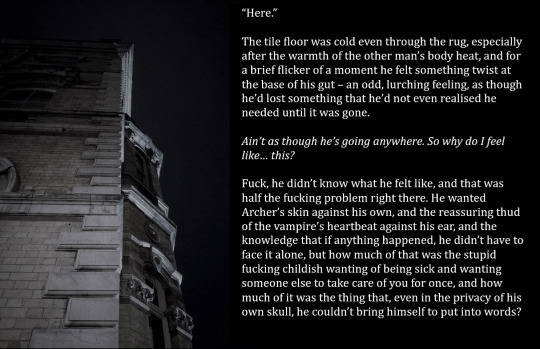
Silver in the Ashes (Argentum in Aqua #2): Chapter 47
Stubborn streak
In which Viola and Mortimer make plans, and Sabbat has a bath
(New to the story? Start here)
(No idea what this is, but interested/intrigued? Go here)
#argentum in aqua#silver in the ashes#gaslamp fantasy#original novel#webnovel#lgbtq fiction#lgbtq fantasy#writeblr#creative writing#web serial#original writing#writing#booklr#writerblr#lgbt fiction#queer fiction#lgbt fantasy#queer fantasy#disability rep#neurodiverse rep#indie author#own voices#authors of Tumblr#transmasc rep#transmasc mc#bi mc#bi rep#lesbian mc#lesbian rep
12 notes
·
View notes
Text
Autism headcanon: Fantine (Les Misérables)
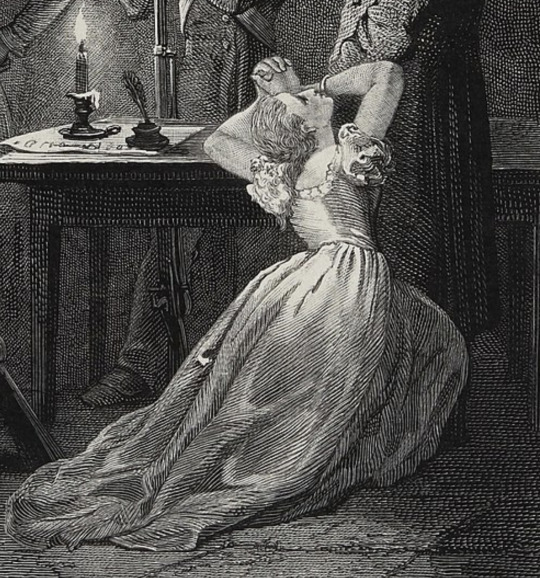
This is just one of many autism headcanons that are possible in Les Misérables. I could view quite a few of those characters as being on the autism spectrum. But this is one that I've never seen other people suggest before, but which rings true to me.
This is based only on Fantine's portrayal in the novel, by the way, not the musical. It would be almost impossible for an actress in the musical to convey all these things.
*By nature, Fantine is quiet, thoughtful, and a dreamer. In her first chapters in Paris, this sets her apart from the other, outgoing and playful grisettes. Even when she's at her happiest, she's more serious and earnest than they are, and Favourite tells her "You always look strange" or "You're always out of sorts," depending on the translation.
*Still, when she talks about something she passionately cares about, particularly the subject of her daughter Cosette, her quietness disappears and she can prattle on and on.
*She's more shy and modest than the other young women of her social class, and doesn't feel comfortable joining them in their bold, flirty games. In Paris, she never lets men other than Tholomyés kiss her, and she refuses to show off her legs by swinging on a swing. In 19th century France, grisettes were more-or-less expected to be coquettish and sexually free – this was how they found men to provide for them – so Fantine is clearly a "different" one.
*She never fits in with the groups of other women she temporarily belongs to. This is arguably one of the main reasons for her tragedy. In Paris, the other three grisettes (especially Favourite) think she's strange, and accuse her of "putting on airs" because she's less flirtatious than they are. They're only "friends" to her because their respective lovers are friends, and after the men leave she loses touch with them. Then, in Montreuil-sur-Mer, she makes no friends among the other factory workers, and depending on the translation, the other women think she either "has ways about her," or, yet again, "puts on airs." Of course this can be explained by the secret she's hiding, but it also mirrors her earlier relationship with Favourite, Dahlia, and Zéphine. The only friendship she ever builds by herself is with her neighbor Marguerite, an elderly woman who serves as her mentor; she never has real friends her own age. It seems that whenever she tries to belong to a group, they label her odd, mistake her reserve for pride, and either casually drift away from her or outright shun her as soon as they have an excuse to do so.
*She can be all too trusting. If she has a tragic flaw, this is it. First she gives both her heart and her virginity to a man who cares neither about her nor about their daughter. Then, even more fatally, she leaves Cosette in the hands of a couple she's only just met, just because their own daughters are happy and well cared for. Taking things too much at face value and trusting too much is a very common pitfall on the autism spectrum.
*In some ways she displays black-and-white thinking. When she's fired from the factory, at first she internalizes society's view of her as a sinner, accepts her firing as justice, and neither protests nor holds it against Monsieur Madeleine. But over the next two years, as she falls deeper and deeper into poverty, she gradually comes to hate Madeleine with all her heart and view him as a monster. So much so that when he saves her from prison, she can't comprehend it: she has to lie to herself that she misheard and that it was Javert who ordered her release just so the world will make sense again. Many of us on the spectrum can relate to that experience of tying our brains into knots to make sense of some jarring new information. Of course, Fantine is far from the only character in this novel with a black-and-white worldview that gets derailed: at least she's not the one who's driven to suicide by it.
*She often tends to be childlike, even after her all her trauma and loss of innocence. Her very name means "childlike" and it fits. For example, after she gets overexcited thinking Monsieur Madeleine has gone to fetch Cosette, and the nuns urge her to lie back down and not talk anymore, she apologizes for having been "naughty" and says that now she'll be "good." And of course there's her tendency to be naïve and too trusting, mentioned above.
*She's very emotionally sensitive, and she seems to have trouble controlling her emotions. In Paris, she comes close to tears at the sight of a horse dying from overwork, which her friends find amusing because to them it's just a fact of life. After giving Cosette to the Thénardiers, she openly cries "as if her heart would break" as she walks out of town (rather than being "seemly" and waiting until she reaches a private place), and when she works at the factory, she sometimes sheds a tear as she thinks of Cosette or Tholomyés, despite being surrounded by other workers. This is one of the "suspicious" details about her that the gossiping women notice. As much as people on the autism spectrum are stereotyped as unemotional, many of us are more sensitive and struggle more with emotional regulation than most people.
*Her attack on Bamatabois when he stuffs the snow down her back is easy to read as a meltdown. Of course anyone who had snow unexpectedly stuffed down their back would scream and probably fight back in self-defense, but Fantine's frightening rage – letting out a "roar," then leaping at Bamatabois "like a panther," beating him, kicking him, clawing at his face with her nails, howling and swearing all the while – goes far beyond self-defense. Now this might be explained as all the helpless rage that's built up inside her for several years finally reaching a breaking point. She might also be drunk – her voice is described as "roughened by brandy," though I don't know if by that Hugo meant that she's drunk in this scene, or just that her voice is roughened by how much she's been drinking in general. Still, to those of us who have had meltdowns, it looks familiar.
*She can be sadly irresponsible with money. When she first gets her job at the factory, she buys furniture on credit, thinking she'll soon earn enough to pay for it. As a result, after she's fired, she can't leave town and find work elsewhere because of her debt. For those of us on the spectrum, it can be hard to understand exactly how money and credit work, let alone mange them by ourselves.
*At the same time, she's memorized the routes between Montreuil-ser-Mer and Montfermeil where Cosette is, and she calculates the distance out loud to herself while she's delirious with fever. While any mother might presumably do this, people on the autism spectrum do tend to have a knack for calculating and memorizing things.
Now, of course, there's no possible way Victor Hugo, writing in the 19th century, could have meant for Fantine to be autistic. Most of the above can be explained by the fact that she's young, an orphan, and uneducated, that she's chronically ill throughout most of her storyline, and that her mental health is damaged by all her trauma. There's also the Doylist argument that Hugo was bad at writing women, which could also explain why she seems "off" at times.
But the realization that Fantine's misery and death are caused not only by society shunning her for her sexual "sin," but by her own tendency to be too trusting, and even more so by her failure to fit in or to play by all of society's many and sometimes contradictory rules, strikes a chord for me. It's terrible to imagine how many autistic women without support have probably suffered in the same ways Fantine does. Hopefully, the more people understand the spectrum, the more support systems there will be.
#autism headcanon#les miserables#les mis#fantine#autism#autism spectrum#neurodiversity#headcanon#fictional characters#tw: violence#tw: suicide mention
14 notes
·
View notes